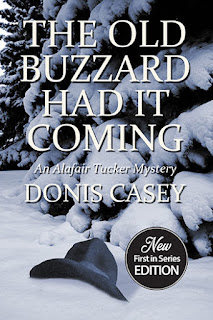I (Donis) was told once that the construction of a mystery begins with a villain. I think it isn’t that simple. A mystery isn’t necessarily about heroes and villains, but more properly an exploration of the nature of evil, if I may wax pompous for a moment.
I am especially intrigued by books that cause the reader to re-examine his ideas about right and wrong. We’ve talked before on this blog about the need for justice to be done in a mystery novel, but does that mean that the killer is always caught and punished? Case in point: Agatha Christie’s Murder on the Orient Express. Was justice done when the killers were discovered? But no. Justice was done when the victim was murdered, and right was done when Hercule Poirot contrived to see that the murderers were not punished. Same deal in my first book, The Old Buzzard Had It Coming. The killer was not the villain at all.
My sleuth in that series, Alafair Tucker, very much had her own ideas of right and wrong, which may or may not have anything to do with legal and illegal. This makes for interesting resolutions to the mysteries, I think. If the author can pull it off, mysteries can really be wonderful explorations of the human psyche. Why do people do what they do? What seems right to one person can do another tremendous harm. Even an insane killer has reasons for murder that make perfect sense to him.
I'm working on a book now in which the protagonist is the villain in two of my previous novels from the Bianca Dangereuse Hollywood series. Her name is Katy, and in The Wrong Girl and Valentino Will Die, she was very much the bad guy. But she was such a fun character that I couldn't let her go. And now, in her very own book she's the heroine of her own life, but she's still has no moral code other than her own survival. She's a delight to write, but she isn't someone you'd trust to watch your jewelry.
One of my favorite villains to write showed up in my eighth Alafair book. He was a charming psychopath, so evil that who knows, he might even have been the devil. When the first edition of All Men Fear Me came out, people were always asking me about the man on the cover, but since the publisher chose the cover and I had no more to do with it than to say, "I like it", I could never tell them who he is, only that he is a perfect depiction of the villain in the book. However, thanks to a curious reader who actually queried my publisher about the cover photo, I now know who the man is!
Here's what the cover artist revealed: "I acquired the actual photo (not a scan or reproduction) from a collector. It is an original 1900s mug shot one of about a dozen that I purchased. The collection is quite intriguing; each mug shot has a frontal face photo, a profile photo and on the back is the name of the arrested and a hand-written description of their crime! Although there were some murderers in the collection of mug shots, this man was arrested for being a 'disorderly person'. His alias was 'Jack the Hugger' and he was arrested in Jersey City, NJ in 1903."
Now there's a story. I imagine old Jack was just a bubble off plumb, and was arrested for walking around Jersey City giving random hugs to people whether they liked it or not.
Here is what the curious reader said to the publisher: "he must have been a murderer! His face was so creepy that I had to turn the book face down on the coffee table when I wasn't reading it!" She then called back a little while later to clarify that she did not mean to insult the cover--in fact, quite the opposite; she thought it caught the spirit of the villain and the book perfectly!



















